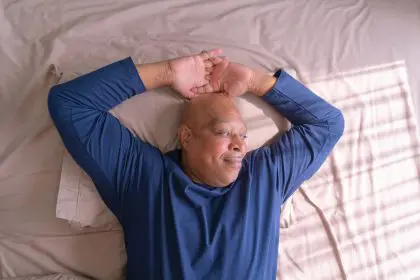
When Maisha Wynn, lifestyle specialist and author, lost her mother to stomach cancer and other health issues, it changed her life. Her health — mental and physical — became her priority. She writes on her blog, “I made a conscious decision to really focus on my temple (body) and universe (mind). Why? I’ve learned when my body and mind are on point, my power flows free and abundantly like the Nile River.”
To achieve her goal, she developed three “Live To Wynn tips and started her personal health journey. ” 1). Make food your best friend, not your foe. 2). Drink more water. 3). Get active. A healthy heart equals an active heart. She stayed true to her word. Today, she is 100 pounds lighter following a 50-day carbs-free challenge. The Chicago-based entrepreneur is the founder of Live to Wynn, a boutique consulting firm. Wynn penned her first book, The Wynning Way: A Guide to Creating Success Your Way to serve as the ultimate go-to guide for personal and professional development. It’s a book/journal that allows the reader to truly self-reflect on their greater purpose through various “wynning” exercises.
In line with the efforts of Childhood Obesity Awareness Month, we decided to reach out to Wynn to share her journey and provide tools for others.

What environmental issues does the Black community face that perpetuate childhood obesity?
Our communities are raising families, future kings and queens, in a desolate wasteland! Where genetics and insufficient physical activity were once the major cause of childhood obesity, this has been replaced with children living in food deserts that pose a serious health threat. Getting to a grocery store nearby is often a challenge for many due to a lack of resources. Consequently, our children have a greater chance of getting high blood pressure, diabetes and a myriad of other health aliments due to being overweight.
What role do parents play in the development of childhood obesity?
Parents play a vital role in their children’s lives. The very first step to preventing childhood obesity begins at home with the parents and other family members. As influencers in their children’s lives, creating an environment where making healthy food choices and being active should be rewarded by positivity to show the value and importance of these choices.
What are three warning signs that help is needed for childhood obesity?
1). Change in your child’s attitude! Pay close attention to their behavior in terms of sleeping more than normal and losing interest in activities they once found enjoyable.
2). Change in your child’s attire! You might not have the best eye to notice the drastic weight gain, but one’s clothes always tell the story. When you start packing on a lot of weight, your attire will begin to fit much tighter.
3). Change in your child’s eating! Like adults, some children may turn to overeating as a coping mechanism for dealing with problems at school or negative emotions caused by a divorce or death of a close family member or friend.
Provide three healthy food choice changes every family should make immediately.
1). Replace sugary drinks with H20! There is nothing more purifying to the temple and universe than water. Not to mention, dehydration may result in a lack of concentration and reduced mental performance. A great way to drink more water is add your favorite fruit.
2). Replace fried foods with grilled foods. Foods that are fried contain a high fat content which increases your blood cholesterol level. High cholesterol levels pose a great health risk and can be linked to heart disease.
3). Pile on the vegetables! Eating more vegetables daily will give you the fiber, nutrients, and antioxidants your family needs to live a healthy existence.
What role does shame and guilt play in childhood obesity?
Shame and guilt play a huge role in childhood obesity. The way others view you often has a greater effect than how you view yourself. This is true especially in a world where images and videos are being posted constantly on social media. That’s why it is up to the parents to educate and edify their children daily. As someone who was once bullied by my peers, the constant love my mother poured into me was my saving grace.
Are there any myths that are culturally shared regarding childhood obesity?
Yes! The number No. 1 myth is childhood obesity being hereditary. I am a living, breathing, walking witness that it is not! I was able to break this generational curse by transforming my life. I started slow by cutting out sugary drinks followed by limiting my intake of fried foods. When it came to working out, I did things I enjoyed doing, like walking on the lakefront.
Provide two affirmations that families can share to support a child dealing with obesity.
These two positive affirmations should be spoken with conviction daily in front of the mirror:
1). I am marvelously and beautifully made in God’s image!
2). My weight is not a measure of my self-worth!
What are three foods that we should eat that children with childhood obesity should learn to love?
These three foods are a “must” in my refrigerator. They not only taste great in salads, but on the grill:
1). Avocados. They are packed with vitamins and a great source of fiber.
2). Broccoli. It’s a great source of protein.
3). Beets. They are high in immune-boosting vitamin C and help with digestion.
What type of counseling is available for childhood obesity, specifically, and obesity in general?
With childhood obesity being such a national epidemic, there are many licensed counselors and/or lifestyle coaches like myself who know the symptoms and remedies based on living it.
Finish these sentences.
As a survivor of childhood obesity … I will continue to share my triumphs to inspire the lives of others! I want the world to know what can be accomplished when you transform your thinking and living! It’s important for those children currently facing childhood obesity to witness someone who conquered it and is now leading a healthy and successful life.
Children with childhood obesity need … parental guidance! Being a parent means not only loving your children, but properly educating them on making the right decisions when it comes to how they view themselves, what they eat, and their level of activity. When parents model smart eating and lead active lives, their children are motivated to follow their example.















